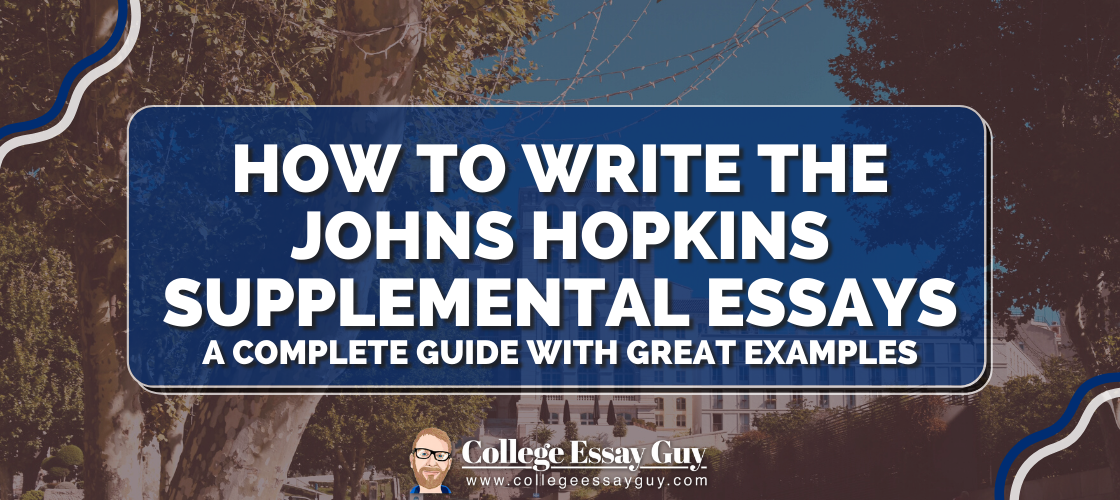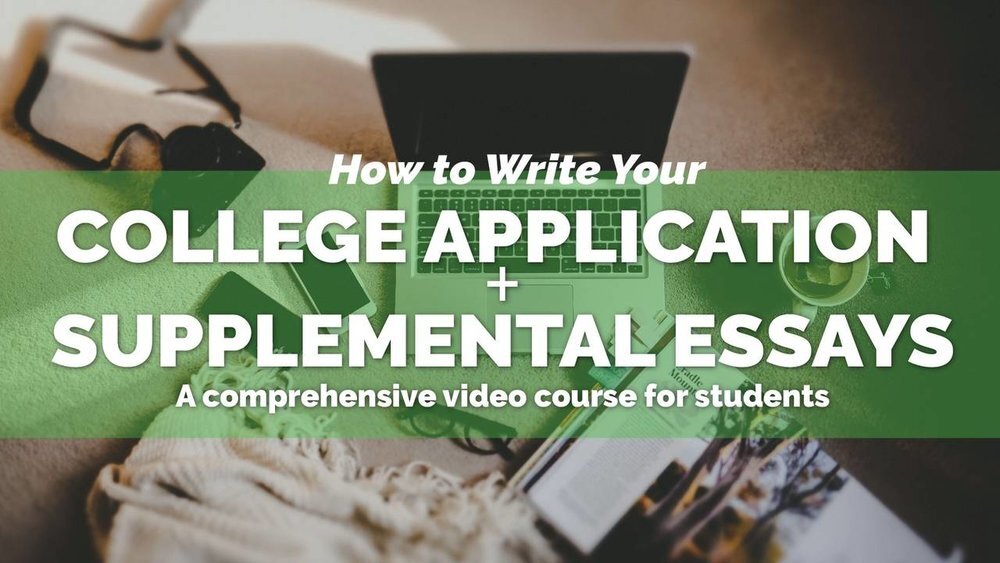This research university is renowned for its robust science and medical programs, but school officials make it clear they’re looking for more than academic stars. Each year, they fill their quads and classrooms with not just deep thinkers but doers.
How do you show you’re just what they’re looking for? JHU officials take the time to note that your essays are especially important in revealing to them who you are and “how you actually think.” And they give you two such opportunities: the Common App personal statement (which, hopefully, you’ve already written) and one supplemental essay, explored in detail below.
Before you write your supplemental essay, get a by-the-numbers look at Johns Hopkins’ offerings, from enrollment and tuition statistics to student life and financial aid information, on its Common Data Set. For deep insights into how America’s oldest research university envisions its role and how it wants to grow and evolve, check out its strategic plan.
And heads-up: Be careful not to write “John” Hopkins in your essay. Yes, it’s actually “Johns,” with an “s.”
What is the Johns Hopkins supplemental essay prompt?
Johns Hopkins Supplemental Essay Prompt #1
How has your life experience contributed to your personal story—your character, values, perspectives or skills—and what you want to pursue at Hopkins? (350 word limit)
How to Write The Johns Hopkins Supplemental Essay Prompt
How has your life experience contributed to your personal story—your character, values, perspectives or skills—and what you want to pursue at Hopkins? (350 word limit)
Most schools ask their applicants to expand on why they’re interested in applying to X school in particular. That’s what we call a “Why us?” essay.
But this question is like a “Why us?” essay … with a twist.
That’s because this prompt flips the “Why us?” question format on its head. At first glance, it seems to be asking “why you?” By that, we mean that it's asking you to elaborate on what makes you a good fit for Johns Hopkins (not what makes Johns Hopkins a good fit for you). It’s asking you to reflect on a community (or multiple communities, or other aspects of your background or experiences) that you’re a part of and then link that to the university.
Before you start writing, we recommend checking out this complete guide on how to write the “Why us?” essay. Pay close attention to the “Why Cornell” and “Why Penn” examples, which are our favorites. Think about how you can incorporate those communities you initially brainstormed into the first part of your essay. That will give your reader a sense of where you’re coming from and how it relates to the interests you want to pursue at Johns Hopkins.
As you write, try to avoid these common mistakes:
Mistake #1: Writing about the school's size, location, reputation, weather, or ranking.
Mistake #2: Simply using emotional language to demonstrate fit.
Mistake #3: Screwing up the mascot, stadium, team colors or names of any important people or places on campus.
Mistake #4: Parroting the brochures or website language.
Mistake #5: Describing traditions the school is well-known for.
Mistake #6: Thinking of this as only a "Why them" essay
Here’s a nice example essay (note that it was written for an older version of the prompt with a slightly different word count, but it would still work well for this year’s).
Example:
Decode “jpwoly”.
Two years ago, I began an all-girls Cybersecurity team, competing in the national Girls Go Cyberstart competition. It seems obvious that a group of people with varied backgrounds and experiences could generate better ideas on keeping personal information safe, yet cybersecurity is one of the least diverse STEM fields – in 2017, it was 11% female. Sometimes when the community you want doesn’t exist, it means creating your own.
During the competition, we four girls spent a week completing hundreds of challenges in cryptography, web analysis, Linux, python, steganography, and more. We quickly realized that though we lacked experience in Cybersecurity, our differing interests and abilities in math or coding were our greatest strength. We delegated many challenges, myself taking cryptography and becoming the resident expert on SQL injections. At the end of Day 1, we were ranked 20th in Colorado, determined to work our way up. We spent far too many hours in our computer science classroom, hogging computers and insisting we just wanted to finish one more challenge.
By week’s end, we’d won our state competition and placed ninth nationally. We used the cash prize to form a cybersecurity club, focusing on getting more girls involved. I’m excited that we’re building a community of girls interested in STEM and cybersecurity – this past year, we had 50 girls competing in Girls Go.
The original team of four collaborated not only with each other during the competition, but also by encouraging interaction among our peers to grow the program. This kind of collaboration is something that excites me about Johns Hopkins—collaboration that fosters new ideas and solutions to problems, especially through interdisciplinary collaboration. I’m fascinated by biomedical research, and would love the opportunity to do undergraduate research, specifically on cancer. I’d like to work in the Sidney Kimmel Center in lung cancer research, with Shyam Sundar Biswal, as he is doing fascinating research about susceptibility to environmental lung diseases. I’ve done some work with dysplasia and how it is affected by carcinogens, and would like to learn more in this area. Outside of science, I’m also interested in the Peabody school’s dance program. The focus the program places on how dance and science interact allows me to explore two different aspects of my life and how they work together, as well as interact with two different groups of people.
By the way, “jpwoly” decodes to “cipher”.
— — —
Tips + Analysis
Connect to your values. Through the story of the author’s cybersecurity club, we get a sense that diversity and inclusion in STEM deeply matter to her. Notice that she doesn’t just state the problem; she uses a statistic to give it context and urgency: “in 2017, it was 11% female.” Then she follows up with this gem to show how she feels about taking action: “Sometimes when the community you want doesn’t exist, it means creating your own.” Big(weld) applause.
Maybe get a little geeky. “Cryptography, web analysis, Linux, python, steganography, SQL injections.” These are not terms the average Joanne throws around. They denote some intimate knowledge of coding and programming, allowing this student to demonstrate her command of the subject matter. Note how she uses this language in just a sentence or two. There’s a fine line between showing your expertise and seeming braggy, so do this sparingly, if at all.
Connect collaboration back to JHU. This student uses the latter third of her essay to basically do a mini “Why Johns Hopkins.” Since the prompt asks “how X has shaped what you want to get out of your college experience at Hopkins,” make sure to let them know! And since JHU doesn’t ask explicitly for a “Why us?” essay like many schools do, this strategy may give you the opportunity to show that you and Johns Hopkins are a great fit, and how deeply you “get” this particular school.
Let’s take a look at another example that also does a solid job of answering the prompt:
Example essay:
Despite the clamor at the bus station, I remained fixated on the person’s leg. His prosthetic limb had restored his ability to move, but he didn’t have access to other subconscious privileges, like wiggling his toes. Weighing the benefits and limitations of these current prosthetics, I realized that these were placeholders, not replacements, for limbs. Wanting to create more innovative prosthetics shaped my interest in applying science and engineering to biological and mental health issues.
I first did this through research, finding an inexpensive alternative to water filtration for developing countries by working with others to analyze the role of nano-patterns in polymer supersaturation. While the results weren’t significant, it piqued my curiosity, motivating me to explore innovative solutions to nuanced issues. But what drew me back to the lab wasn’t research’s long-term benefits: it was the hope it offered, a possible solution to a seemingly unresolvable issue.
Energized by the enthusiasm I’d experienced in the lab, I also wanted to make an immediate impact on my community. After a local middle school lost its STEM extracurricular funding, our robotics team established and mentored FIRST Lego League there, working with children to create functioning products and emphasizing collaborative learning over lecturing.
But this was one school. One issue. I wanted to continue educating people about global problems through engineering. Such an opportunity arose after five district-wide suicides in forty days. To promote mental health awareness and discourage drug misuse, I worked with friends to create braiNformation, describing depression signs and drugs’ effects, and worked with Rise Above Colorado to increase awareness. Through research and community outreach, I’ve grown to embrace proactive, unorthodox problem-solving.
When I sat in on Dr. Joel Bader’s Systems Biology of the Cell lecture, I was fascinated by the open collaboration between Dr. Bader and the class as they applied calculus to the central dogma of biology. To me, this collaboration is a microcosm of JHU’s community. Through Psychopathology for Public Health and JHU’s Active Minds chapter, I’d continue learning about global mental wellness issues and work with others to expand braiNformation’s reach. But I wouldn’t stop there. I hope to continue solving larger clinical problems through the BME Undergraduate Design Team and researching changes in brain components to understand neurodegenerative diseases in Dr. Tilak Ratnanather’s lab. At JHU, I’d have many opportunities to apply classroom learning, making profound impacts on the world through cutting-edge, collaborative endeavors.— — —
Tips + Analysis:
Start with a clear thesis that acts as sort of a summary of how the essay will unfold. By thesis, we mean a statement, probably just a sentence, that summarizes generally what you’ll cover in this essay. It doesn’t have to be in the first sentence, but it should at least fit somewhere in the intro, maybe at the end, as sort of a launch line. That’s what this student does. He starts out strong with a colorful and unique anecdote that explains his interest in innovating prosthetics, then uses that to tie nicely into his thesis: “Wanting to create more innovative prosthetics shaped my interest in applying science and engineering to biological and mental health issues.” Notice that he doesn’t list all of his accomplishments upfront, and instead only points out the general themes he’s interested in. This gives the reader a sense of where he’s going without giving everything away. Then he uses the next two-thirds of the essay to cover the work he’s done in the areas of science, engineering, and mental health. Speaking of which ...
Think of this essay as two-thirds/one-third. This essay is a nice example of how to dedicate the first two-thirds of your space to answering the first part of the prompt—you’d like the admissions committee to know about you (your interests, your background, your identity or your community). Even in the prompt’s second part, the emphasis remains on how those things have “shaped what you want to get out of your college experience at Hopkins.” So your interests/experiences should take up the bulk of your essay, and then save a little room at the end to...
Be specific when tying your interests back to JHU. Being as detailed as possible—we’re talking naming specific courses, professors, research opportunities, even clubs and other on-campus activities, if they’re relevant—will help Hopkins officials envision you on campus, not only thriving but contributing. This student uses that last third of his essay well by making strong, clear connections between his interests and how JHU can help him pursue them. Like this: “I hope to continue solving larger clinical problems through the BME Undergraduate Design Team and researching changes in brain components to understand neurodegenerative diseases in Dr. Tilak Ratnanather’s lab.”
And here are a couple more Hopkins examples:
Example:
Whenever teachers pass back tests, I always grab the top right corner. It’s an old habit from my middle school days. As someone who grew up in a “gifted kid” program, the worth of our preteen selves was socially dependent on how well we did academically. To protect myself from the judgmental lean-over from the kid next to me, trying to get a peek at my score, I learned to grab the test paper by the corner where the score was usually written. So, my transition to high school proved to be quite shocking, as I was confronted with the difference between healthy and toxic competition. Most of the students at the school thrived due to their own work ethic, rather than bragging about getting 100s on tests they didn’t study for. When I got a low score on a test, instead of being exceptionally hard on myself, I pushed myself to study even harder to get the results I knew I could achieve. Slowly but surely, I stopped reaching for the upper right corner of my test papers.
As my unhealthy preoccupation with my grades subsided, I found that I became more driven to help the people around me. Whether I’m motivating people as badminton team captain, being part of a link crew leadership program and helping freshmen acclimate to the school, or simply being a good friend, every person I help is someone I can liberate from the fear of inadequacy that plagued my younger self. I want to make sure everyone knows their voice is valid, no matter their background. At Johns Hopkins, I hope to do the same: making sure everyone in a group project’s opinions are heard, sharing research with other students, or doing the small things, like helping a classmate study for a test. Especially in the field of research, it is critical that each scholar recognizes the validity of others’ views. Because no matter what the task, we can always achieve more when everyone works together.
_ _ _
Example:
Since middle school, I have been captivated by the natural sciences and eagerly took notes in every earth science and biology class. During 10th grade, I was walking through the 4th-floor halls at my school when I spotted a tank of little wiggling fish. After a week, I shyly offered to scrub the aggressive algae on the glass. That one small decision launched me into running Trout in the Classroom and sparked a chain reaction of searching for extracurricular learning opportunities.
With little experience in animal care, I learned everything on my own: how to test water quality, the ideal environment for Salvelinus fontinalis (Brook Trout), and their role in the ecosystem. Every week, I ensured the system ran effectively by testing and changing water. My passion for these aquatic animals made aquarium maintenance a time when I could learn skills that weren’t taught in any curriculum. At the end of the six months, I presented to earth science students about the importance of trout and how these fish interact with the ecosystem. This experience taught me how to present to and connect with my audience’s prior knowledge. With the global scope of earth science, I really enjoyed showing how one could make an environmental difference on a local level.
A few weeks later, I joined the class in releasing trout into Bull Run Mountain Preserve with the help of ecology experts, who taught us about the native invertebrates that would provide nutrients for our indicator species. It was an unforgettable experience, and I continued leading the program in 11th grade. Now in 12th grade, I will use the skills and experience I have accumulated over the last two years to further develop my knowledge in freshwater biology and, more importantly, teach the next leader who will continue the program.
I love the interactions between organisms and their connection to the larger environment, and will carry my interest in environmental science to Johns Hopkins. Also with me are the skills I developed from Trout in the Classroom: welcoming new opportunities, pursuing self-directed research, and presenting my findings to others. (349 words)
Want advice on dozens of other supplemental essays? Click here.
Special thanks to Nicole for contributing to this post.
Nicole learned how to tell other people’s stories after a 30+-year career as a newspaper reporter, covering both the mundane and the unforgettable, from serial killer Duane Owen’s retrial, to the Bush/Gore nail-biter, to the homeless family of four who found refuge in a storage unit. Her ideal day is spent playing Cribbage with her dad, beating her husband at RummiKub and planning the next girls trip with her teenage daughters.
Top values: Creativity | Growth | Meaningful Work
TRY OUT THE COLLEGE APPLICATION + SUPPLEMENTAL ESSAYS COURSE
Create amazing supplemental essays for the most selective schools, polish your activities list, and complete everything else with ease and joy. Learn more here.










